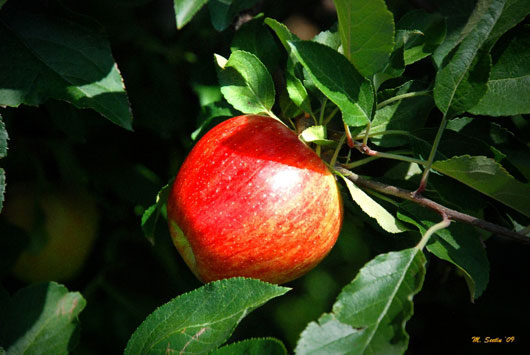 FISHERS, N.Y. – The harvest of New York State’s most popular apple varieties begins this week. The quality of the fruit this season is outstanding, with continuous sunshine and heat this summer putting high sugar levels into fruit, according to grower reports.
FISHERS, N.Y. – The harvest of New York State’s most popular apple varieties begins this week. The quality of the fruit this season is outstanding, with continuous sunshine and heat this summer putting high sugar levels into fruit, according to grower reports.
“Consumers should expect super sweet apples from our growers this fall,” said New York Apple Association president Jim Allen.
“Our crop is very early this year, so look for your favorite varieties at least a week sooner than typical,” Allen said.
McIntosh apples are being picked right now across the state. Other varieties picked this week include Gala and Honeycrisp. The New York Apple Association is again partnering with retailers this fall to help alert consumers to the local aspect of the crop. “Buy local” signage and “New Crop Apple” displays will be in place in most supermarket produce departments.
“We hope New York consumers will pick our local apples versus apples from across the continent,” Allen said. “Our apples taste more fresh and flavorful because they just came off the tree and were shipped directly to your store.”
Apples grown locally taste better, are more crunchy and fresh and leave a smaller “carbon footprint” since they travel shorter distances to market, helping the environment.Growers are predicting a 27 million bushel crop, with outstanding growing conditions throughout much of the summer, especially the past month.
A complete directory of the state’s orchards, as well as variety info, recipes and health facts can be found online at www.nyapplecountry.com.
Availability Dates For 2010 New York Apple Crop:
Jersey Mac In the barn
Tydeman In the barn
Paula Red In the barn
Ginger Gold In the barn
Jonamac In the barn
Zestar In the barn
McIntosh This week
Gala This week
Honeycrisp This week
Cortland 9/10 – 9/20
Macoun 9/20 – 10/1
Empire 9/22 – 10/1
Spartan 9/25 – 9/30
Jonathan 9/25 – 9/28
Red Delicious 9/25 – 10/15
Jonagold 9/25 – 10/8
Lady Apple 9/25 – 10/1
20 Ounce 9/25 – 10/1
Crispin 9/30 – 10/10
Golden Delicious 10/5 – 10/15
Idared 10/10 – 10/18
Fuji 10/10 – 10/25
Rome 10/15 – 10/18
Fortune 10/15 – 10/20
Cameo 10/15 – 10/25
Stayman 10/15 – 10/25
Northern Spy 10/15 –
Braeburn 10/15 – 10/30
About the New York Apple Association:
Based in Fishers, N.Y., the NYAA is the nonprofit agricultural trade association representing the commercial apple growers in New York. It supports profitable growing and marketing of New York apples through increasing demand for apples and apple products; representing the industry at state and federal levels and serving as the primary information source on New York apple related matters.
Source: www.nyapplecountry.com